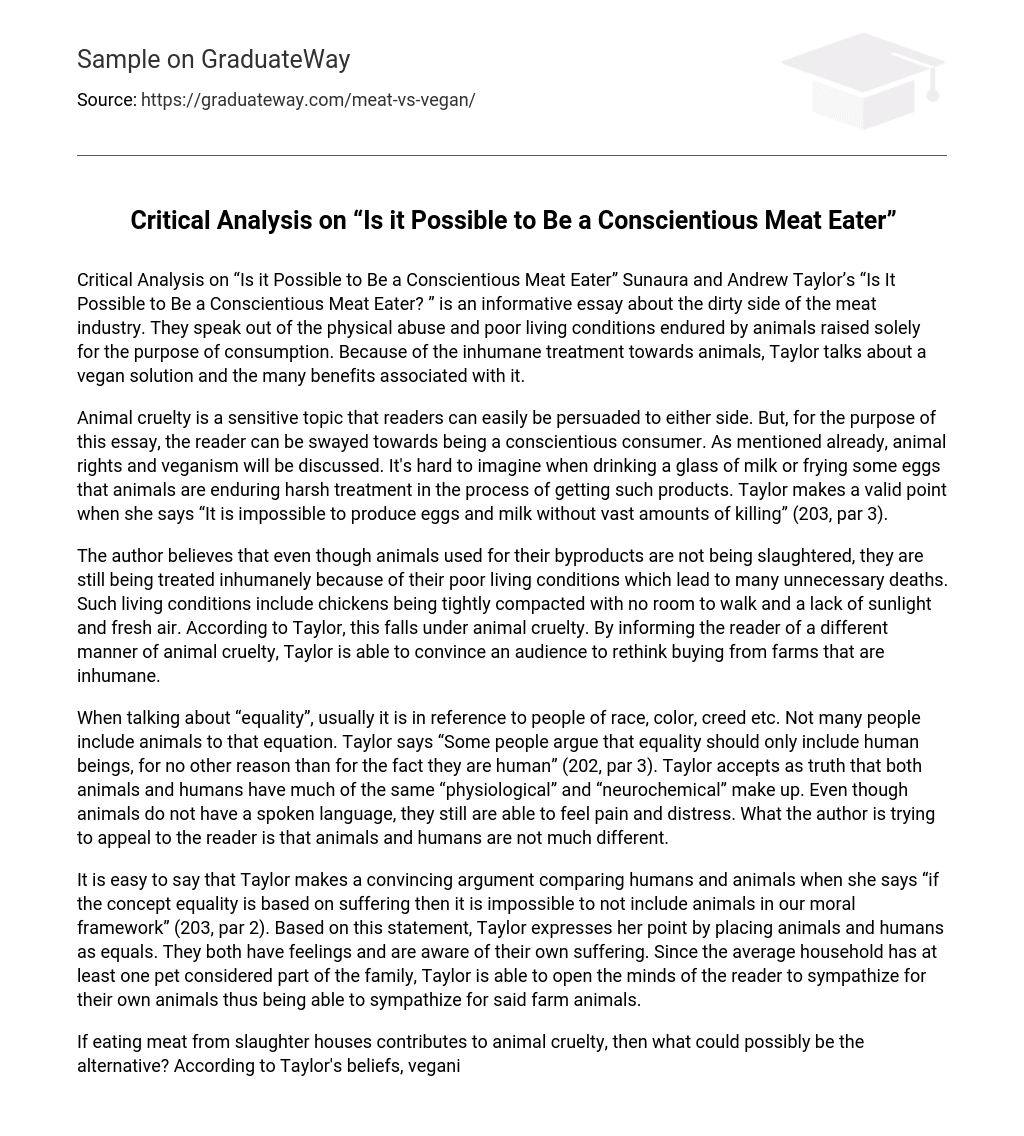“Is It Possible to Be a Conscientious Meat Eater? ” is an informative essay discussing the unethical practices within the meat industry, highlighting the physical abuse and substandard living conditions endured by animals raised for consumption. In light of this inhumane treatment, Taylor explores the idea of a vegan alternative and explains the various advantages it offers.
When it comes to animal cruelty, readers can easily be swayed to take different sides. However, this essay aims to convince the reader to become a conscientious consumer. The focus will be on animal rights and veganism. It may be hard to believe, but while enjoying milk or cooking eggs, it is crucial to remember that animals endure harsh treatment in the production process of these items. Taylor emphasizes this by stating, “It is impossible to produce eggs and milk without vast amounts of killing” (203, par 3).
The author argues that animals used for their byproducts are subjected to inhumane treatment due to their overcrowded living conditions and lack of sunlight and fresh air. Despite not being slaughtered, these animals suffer unnecessary deaths. Taylor asserts that such conditions can be considered animal cruelty and aims to persuade readers to reconsider purchasing from farms that are deemed inhumane.
When the topic of “equality” is discussed, it typically pertains to individuals of various races, colors, creeds, etc. However, animals are often excluded from this consideration. Taylor suggests that certain individuals believe equality should solely apply to humans simply because they are human (202, par 3).
Taylor believes that animals and humans share similar physiological and neurochemical characteristics. Despite the absence of a spoken language in animals, they still experience pain and distress. The author’s intention is to demonstrate that there is not much disparity between animals and humans.
Taylor presents a compelling argument equating humans and animals, stating that if the concept of equality is founded on suffering, it is imperative to include animals in our moral framework (203, par 2). By highlighting the shared capacity for feelings and awareness of suffering between humans and animals, Taylor emphasizes their equal standing. Considering that many households have pets considered family members, Taylor prompts readers to empathize with their own animals and, consequently, extend that empathy to farm animals as well.
According to Taylor’s beliefs, if eating meat from slaughterhouses contributes to animal cruelty, then veganism can be a possible alternative. Taylor argues that veganism is beneficial for both people and the ecosystem because it is a humanitarian diet consisting of all natural foods. This diet is safe for the planet and eliminates the suffering of animals for their meat and byproducts. Taylor effectively argues that crops can go further and feed more people.
There is no doubt that animals do not experience suffering when someone opts for a vegan lifestyle. However, a drawback of a vegan diet is its cost. Organic foods, in general, are significantly more expensive, making it difficult for some people to fully sustain such a lifestyle change. In summary, Taylor effectively educates the reader about the sources of the meat they consume. The reader becomes aware that farms and slaughterhouses fail to acknowledge the distress and pain animals endure. Through emphasizing sympathy and ethics, the authors successfully persuade the reader to become a more mindful consumer, if nothing else.
Readers are well-informed enough to consciously consider investigating the treatment of animals by their preferred companies. While not all readers will completely stop consuming meat, a significant number will scrutinize their food more closely and consequently become more conscientious. The ultimate decision lies between veganism and continuing to consume meat.
- Works Cited
- Taylor, Sunaura. Andrew Taylor. “Is it Possible to be a Conscientious Meat Eater? ” Current Issues and Enduring Questions. Ed. Sylvan Barnet & Hugo Bedau. 9th ed. Boston: Bedford/St Martin’s, 2011. Print.





